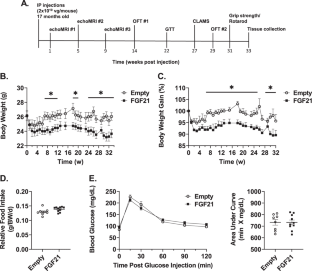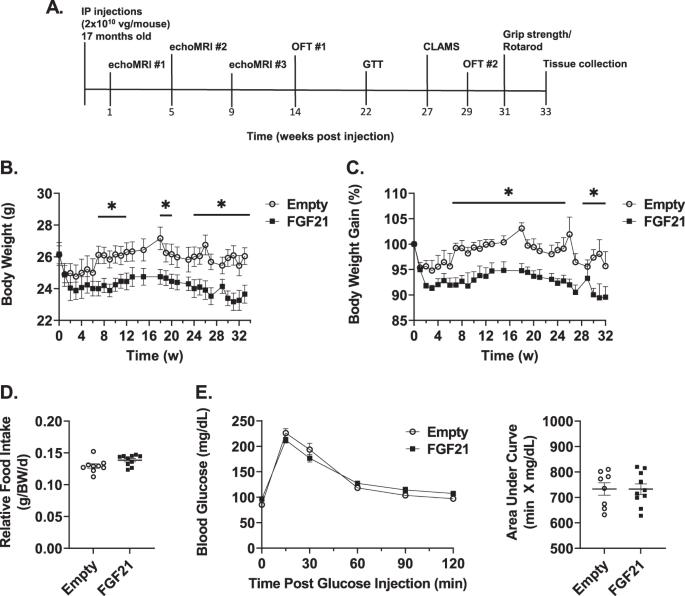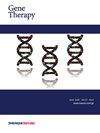脂肪导向的FGF21基因治疗对老年雌性小鼠的长期影响。
IF 4.5
3区 医学
Q1 BIOCHEMISTRY & MOLECULAR BIOLOGY
引用次数: 0
摘要
成纤维细胞生长因子21(FGF21)已被开发为代谢综合征的潜在治疗剂。此外,FGF21被认为是一种促长寿激素,因为过表达FGF21的转基因小鼠显示出延长的寿命,增加了使用FGF21促进健康衰老的可能性。我们最近发现,内脏脂肪导向的FGF21基因治疗改善了胰岛素抵抗BTBR小鼠的代谢和免疫健康。在这里,我们在17个月大的雌性小鼠中使用脂肪导向的rAAV-FGF21载体来研究长期的FGF21基因转移是否可以减轻衰老相关的功能下降。与年龄匹配的对照小鼠相比,接受FGF21治疗的动物在7个月的研究中表现出稳定、显著的低体重。FGF21治疗减少了肥胖,增加了相对瘦体重和能量消耗,这与FGF21血清水平高出近100倍有关。然而,这些变化并没有转化为对肌肉功能的益处,也没有影响肝脏的代谢功能。总的来说,我们已经证明,单剂量的脂肪导向AAV-FGF21治疗可以在很长一段时间内提供可持续的高血清FGF21水平,并且主要影响脂肪组织的稳态和能量消耗。在老年小鼠中单独高水平的FGF21不足以改善肝脏或肌肉功能。本文章由计算机程序翻译,如有差异,请以英文原文为准。


Long-term effects of a fat-directed FGF21 gene therapy in aged female mice
Fibroblast growth factor 21 (FGF21) has been developed as a potential therapeutic agent for metabolic syndromes. Moreover, FGF21 is considered a pro-longevity hormone because transgenic mice overexpressing FGF21 display extended lifespan, raising the possibility of using FGF21 to promote healthy aging. We recently showed that visceral fat directed FGF21 gene therapy improves metabolic and immune health in insulin resistant BTBR mice. Here, we used a fat directed rAAV-FGF21 vector in 17-month-old female mice to investigate whether long-term FGF21 gene transfer could mitigate aging-related functional decline. Animals with FGF21 treatment displayed a steady, significant lower body weight over 7-month of the study compared to age-matched control mice. FGF21 treatment reduced adiposity and increased relative lean mass and energy expenditure associated with almost 100 folds higher serum level of FGF21. However, those changes were not translated into benefits on muscle function and did not affect metabolic function of liver. Overall, we have demonstrated that a single dose of fat-directed AAV-FGF21 treatment can provide a sustainable, high serum level of FGF21 over long period of time, and mostly influences adipose tissue homeostasis and energy expenditure. High levels of FGF21 alone in aged mice is not sufficient to improve liver or muscle functions.
求助全文
通过发布文献求助,成功后即可免费获取论文全文。
去求助
来源期刊

Gene Therapy
医学-生化与分子生物学
CiteScore
9.70
自引率
2.00%
发文量
67
审稿时长
4-8 weeks
期刊介绍:
Gene Therapy covers both the research and clinical applications of novel therapeutic techniques based on a genetic component. Over the last few decades, significant advances in technologies ranging from identifying novel genetic targets that cause disease through to clinical studies, which show therapeutic benefit, have elevated this multidisciplinary field to the forefront of modern medicine.
 求助内容:
求助内容: 应助结果提醒方式:
应助结果提醒方式:


